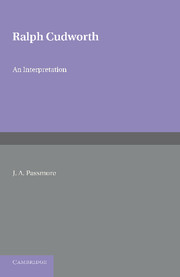Book contents
- Frontmatter
- Contents
- Preface
- Abbreviations
- CHAPTER I Cudworth and his Predecessors
- CHAPTER II Cudworth on Mind and Nature
- CHAPTER III Cudworth's Theory of Knowledge
- CHAPTER IV ‘Eternal and Immutable Morality’
- CHAPTER V Cudworth's Moral Psychology
- CHAPTER VI The Good Life
- CHAPTER VII Ethics and Religion
- CHAPTER VIII Cudworth and the British Moralists
- Appendix: The Cudworth Manuscripts
- A Cudworth Bibliography
- Index of Names
CHAPTER VI - The Good Life
Published online by Cambridge University Press: 05 June 2016
- Frontmatter
- Contents
- Preface
- Abbreviations
- CHAPTER I Cudworth and his Predecessors
- CHAPTER II Cudworth on Mind and Nature
- CHAPTER III Cudworth's Theory of Knowledge
- CHAPTER IV ‘Eternal and Immutable Morality’
- CHAPTER V Cudworth's Moral Psychology
- CHAPTER VI The Good Life
- CHAPTER VII Ethics and Religion
- CHAPTER VIII Cudworth and the British Moralists
- Appendix: The Cudworth Manuscripts
- A Cudworth Bibliography
- Index of Names
Summary
The central conception in Cudworth's ethics is goodness, not duty. He writes: ‘It would be one of the surest means to judge without mistake of our progress in goodness if men did judge of their improvement by the love of virtue rather than by doing their duty. For to be virtuous is to have the temper of one's mind transformed into a heavenly love … but doing one's duty is doing it indeed as an act of submission and obedience, but with restraint and indifference of will, the will not being moved to it from the excellency of the act itself. … Love would make the obedience more lasting and more willing and to become the natural disposition and temper of the mind: this is freedom and liberty; the other is the tiresome task and slavish imposition of religion.’ As this passage suggests, and as we saw in detail in our discussion of Eternal and Immutable Morality, Cudworth wishes to retain the ordinary view that obedience to law has a certain virtue in it. But even obedience must be freely given if it is to manifest the specifically ethical properties; its motive must not be servility, it must be love.
Thus the task of moral theory, to Cudworth, does not consist in drawing up a list of duties, in the manner characteristic of the commonplace moralists; his peculiar problem could rather be put thus: to describe the good life. Naturally, he begins by assuming that certain kinds of life are good and others evil. He is not inventing a distinction but, rather, he is trying to elucidate more fully a distinction already perfectly familiar: with this reservation, of course, that the elucidation may bring to light differences which were not previously suspected. (Just as botany begins from the quite familiar notion of a flower, but ends by describing as ‘flowers’ many types of vegetation which no ordinary person ever calls by that name.)
One characteristic of the good life has already come to the fore: spontaneity or freedom—'the free air of perfect liberty'. ‘Freedom’ need not now be understood in a metaphysical sense; Cudworth is referring to a property of human actions which is perfectly familiar to us, and the existence of which is not at all incompatible with determinism.
- Type
- Chapter
- Information
- Ralph Cudworth , pp. 68 - 78Publisher: Cambridge University PressPrint publication year: 2013

